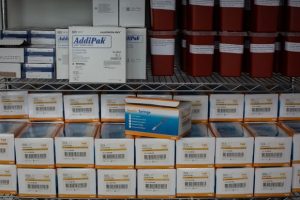Record Overdose Deaths Prompt Congress to Reconsider Needle Aid
- House to vote on bill that would end ban on funding syringes
- Supporters say administration should help enact change
Bloomberg Government subscribers get the stories like this first. Act now and gain unlimited access to everything you need to know. Learn more.
Chris Abert describes his work as essential and precarious, an effort that saves lives but operates on the margins. He’s hoping Congress, for the first time, will help.
“Funding for us is so precarious right now, the legality of what we’re doing is precarious,” said Abert, founder of the Indiana Recovery Alliance, which distributed more than 1 million syringes to people in the state last year and thousands of doses of the opioid overdose-reversing naloxone.
Like many similar harm reduction programs, the Alliance operates on a shoestring budget. The group has two employees, six volunteers and a $390,000 budget that largely goes to buying syringes, Abert said in an interview.
It’s the kind of program the Biden administration and drug policy activists say is essential to reversing the year-after-year increases in overdose deaths in the U.S. and slowing the spread of diseases such as hepatitis C and HIV.
A long-standing policy rider on federal spending bills has kept programs like the Recovery Alliance from receiving government grants to buy syringes or needles. The House plans to vote next week on a “minibus” spending bill that would end that prohibition for public health campaigns.
U.S. Had Most Drug Overdose Deaths on Record in 2020, CDC Says

David Ryder/Getty Images
Harm reduction supplies, including needles, at the offices of Seattle’s Co-LEAD program on May 6, 2020. Co-LEAD grew from Seattle’s Law Enforcement Assisted Diversion program to respond to the Covid-19 pandemic by keeping low-level criminals and the homeless out of jail.
The move has been applauded by groups that want the nation’s drug control policy to focus more on promoting public health and less on jailing drug users.
Congress is “starting to reckon with this public health crisis in a way that makes sense” by increasing access to these programs, Maritza Perez, director of the Office of National Affairs at the Drug Policy Alliance, said in a statement.
Supporting Harm Reduction
The overdose crisis in the U.S. has reached an all-time high: More than 93,000 Americans died from overdoses in 2020, the most ever recorded.
Needle exchanges, where anyone can acquire clean syringes, are effective tools for reducing HIV and other infections and help direct people with substance use disorders to treatment, according to the Centers for Disease Control and Prevention.
The House’s fiscal 2022 spending bill for the Department of Health and Human Services (H.R. 4502) would give the CDC $56.5 million to expand access to syringes and address other consequences of drug use.
Syringe service programs generally fall into the category of “harm reduction,” a drug treatment response that emphasizes safe use and supports for people with addiction.
President Joe Biden’s fiscal 2022 budget called for more than $10 billion to “support research, prevention, treatment, harm reduction, and recovery support services” among other initiatives.
The CDC can currently fund harm reduction services, but that money can’t be used to purchase needles or syringes, the agency says in guidance for grantees.
These programs are often contentious. Most states restrict where they can operate and how they receive public funds, Daniel Raymond, director of policy for the National Viral Hepatitis Roundtable, said.
As a result, many are small and don’t have the resources to scale up to respond to outbreaks of disease or increasing demand, Raymond said. Federal funds could change that dynamic.
“We’ve got hundreds of these programs and I think most could double and not reach the demand right now,” he said.
Fentanyl Deaths Fuel Pressure on Biden to Toughen Enforcement
Fight in the Senate
Senate appropriators are at odds over several policy riders, including bans on federal money for abortions. Sen. Roy Blunt (Mo.), the top Republican on the panel responsible for the bulk of federal health funds, said a HHS spending bill might not pass the Senate without these riders.
“For the bills to pass we’re going to need to maintain most of the long-agreed-to language and I hope we do,” Blunt said.
Shelley Moore Capito (R-W.Va.), who sits on the Senate Appropriations Committee, said she doesn’t oppose ending the ban but the issue isn’t central to how she wants to respond to the rise in overdose deaths, which hit her home state harder than almost any other.
“A properly run harm reduction plan can help in the public health space of the addiction issues that are ravishing my state,” she said. “Getting more resources there, federal resources, is something I’d be willing to look at.”
This debate in the Senate is where advocates want the Biden administration to step in to persuade lawmakers to back ending the ban on funds for syringes.
“I want to see an administration that’s prepared to put some juice into it,” Raymond said.
Abert said just opening up the funding would signal that the White House and Congress are serious about supporting programs like his.
“If you look at our budgets—where we put our money—as moral inventories, then we don’t value the lives of people with trauma,” Abert said.
To contact the reporter on this story: Alex Ruoff in Washington at aruoff@bgov.com
To contact the editors responsible for this story: Robin Meszoly at rmeszoly@bgov.com; Sarah Babbage at sbabbage@bgov.com
Stay informed with more news like this – from the largest team of reporters on Capitol Hill – subscribe to Bloomberg Government today. Learn more.